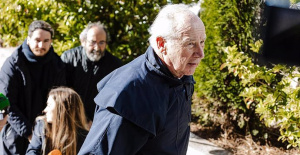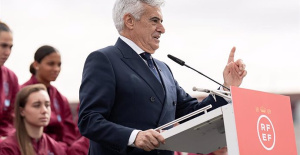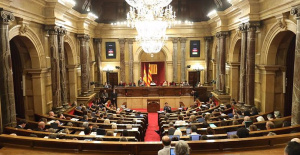MADRID, 29 Nov. (EUROPA PRESS) -
The two candidates of the Executive to the Constitutional Court (TC) - the former Minister of Justice Juan Carlos Campo and the former director of the Ministry of the Presidency of the Government Laura Díez Bueso - will have to abstain in the court of guarantees of the matters in which they have intervened from his previous positions in the Public Administration.
Juan Carlos Campo was the Minister of Justice who approved the pardons for those convicted of the independence process in Catalonia and who later returned to the National Court to join the Criminal Chamber, where he has had to refrain from cases with politicians. Laura Díez Bueso, for her part, is a professor at the University of Barcelona who was an adviser to the Catalan Government for the reform of the Statute and a former senior position in the Ministry of the Presidency of the Government of Pedro Sánchez.
Legal sources consulted by Europa Press indicate that Campo should abstain in all matters in which he could have intervened previously as a judge and in all bills in which his Ministry has intervened, as well as those that he was aware of when he was in office. Minister council.
The sources also specify that the former minister should also step aside in cases in which laws that he had voted in Congress when he was a deputy (2016-2020) are challenged.
In this sense, they consider that the "logical" thing is that Campo, as a magistrate, is aware of when he has to abstain without the need for any challenge to be filed against him. The same points to the case of Díez.
The sources consulted assure that Díez would have to distance himself from matters of which he might have been aware when he was an adviser to the Government between 2002 and 2004 and when he was attached to the Síndic de Greuges of Catalonia -the Catalan Ombudsman-- between 2004 and 2010.
According to the same sources, she should also refrain from cases in which she could have intervened when she was director in the cabinet of the Secretary of State for Relations with the Courts of the Ministry of the Presidency (between 2018 and 2020) and more recently as general director of Constitutional Affairs and Legal Coordination of the Ministry of the Presidency (between 2020 and 2022).
Other legal sources, however, indicate that he would not have to abstain, since his charges were not decisive. However, they clarify that, if it is proven that he had any relevant participation in the drafting of the texts that are challenged in the Constitutional Court, he should step aside.
In the case of Campo, his previous responsibility in Justice would lead him to have to abstain in the deliberations related to the appeals presented against laws promoted from the Council of Ministers in which he sat, such as the so-called 'Celáa law'.
The Government approved in March 2020, when Campo was minister, the draft of the new education law, the LOMLOE, which came into force in January 2021, introducing reforms such as the religion subject not counting for average grades; the prohibition that subsidized schools segregate by sex; the fixing of the "exceptionality" of the repetition of course; or the suppression of the reference to Spanish as the "official language of the State".
The so-called 'Celáá law', by the minister who promoted it, was appealed before the Constitutional Court by deputies from Vox and PP. The then 'popular' president, Pablo Casado, described it as "an attack against freedom" and against the quality of the system and its unity.
Doubtful are the cases, also appealed before the TC, of the euthanasia law or to prevent an expired CGPJ --like the current one-- from making discretionary appointments in the judicial leadership, since they were promoted as bills from the parliamentary group of the PSOE and the socialists and Unidas Podemos, respectively, when Campo was a minister but no longer a deputy.
From the Government they have defended the suitability of both candidates. The Minister of the Presidency, Félix Bolaños, has assured that the Executive will send the agreement to the Constitutional Court "so that it can formally verify" that Campo and Díez "comply with the suitability requirements established by law."

 Exploring Cardano: Inner Workings and Advantages of this Cryptocurrency
Exploring Cardano: Inner Workings and Advantages of this Cryptocurrency Seville.- Economy.- Innova.- STSA inaugurates its new painting and sealing hangar in San Pablo, for 18 million
Seville.- Economy.- Innova.- STSA inaugurates its new painting and sealing hangar in San Pablo, for 18 million Innova.- More than 300 volunteers join the Andalucía Compromiso Digital network in one month to facilitate access to ICT
Innova.- More than 300 volunteers join the Andalucía Compromiso Digital network in one month to facilitate access to ICT Innova.-AMP.- Ayesa acquires 51% of Sadiel, which will create new technological engineering products and expand markets
Innova.-AMP.- Ayesa acquires 51% of Sadiel, which will create new technological engineering products and expand markets The Prosecutor's Office requests 63 years in prison for Rato and a fine of more than 42 million euros
The Prosecutor's Office requests 63 years in prison for Rato and a fine of more than 42 million euros Marlaska puts more radars, surveillance on highways and motorists, and controls in the face of the increase in accidents
Marlaska puts more radars, surveillance on highways and motorists, and controls in the face of the increase in accidents Pedro Rocha, elected new president of the RFEF
Pedro Rocha, elected new president of the RFEF The PSC would win the elections with 40-47 seats and ERC is ahead of Junts, according to the CEO
The PSC would win the elections with 40-47 seats and ERC is ahead of Junts, according to the CEO How Blockchain in being used to shape the future
How Blockchain in being used to shape the future Not just BTC and ETH: Here Are Some More Interesting Coins Worth Focusing on
Not just BTC and ETH: Here Are Some More Interesting Coins Worth Focusing on The UA opens the call for the Impulso 2024 Awards for the best innovative business initiatives
The UA opens the call for the Impulso 2024 Awards for the best innovative business initiatives ALI, virtual assistant from Alicante, internationally recognized by the OECD
ALI, virtual assistant from Alicante, internationally recognized by the OECD Retrópolis brings the golden age of video games and computing to the UPV
Retrópolis brings the golden age of video games and computing to the UPV Looking for video games that value the neighborhoods of Valencia
Looking for video games that value the neighborhoods of Valencia A million people demonstrate in France against Macron's pension reform
A million people demonstrate in France against Macron's pension reform Russia launches several missiles against "critical infrastructure" in the city of Zaporizhia
Russia launches several missiles against "critical infrastructure" in the city of Zaporizhia A "procession" remembers the dead of the Calabria shipwreck as bodies continue to wash up on the shore
A "procession" remembers the dead of the Calabria shipwreck as bodies continue to wash up on the shore Prison sentences handed down for three prominent Hong Kong pro-democracy activists
Prison sentences handed down for three prominent Hong Kong pro-democracy activists ETH continues to leave trading platforms, Ethereum balance on exchanges lowest in 3 years
ETH continues to leave trading platforms, Ethereum balance on exchanges lowest in 3 years Investors invest $450 million in Consensys, Ethereum incubator now valued at $7 billion
Investors invest $450 million in Consensys, Ethereum incubator now valued at $7 billion Alchemy Integrates Ethereum L2 Product Starknet to Enhance Web3 Scalability at a Price 100x Lower Than L1 Fees
Alchemy Integrates Ethereum L2 Product Starknet to Enhance Web3 Scalability at a Price 100x Lower Than L1 Fees Mining Report: Bitcoin's Electricity Consumption Declines by 25% in Q1 2022
Mining Report: Bitcoin's Electricity Consumption Declines by 25% in Q1 2022 Oil-to-Bitcoin Mining Firm Crusoe Energy Systems Raised $505 Million
Oil-to-Bitcoin Mining Firm Crusoe Energy Systems Raised $505 Million Microbt reveals the latest Bitcoin mining rigs -- Machines produce up to 126 TH/s with custom 5nm chip design
Microbt reveals the latest Bitcoin mining rigs -- Machines produce up to 126 TH/s with custom 5nm chip design Bitcoin's Mining Difficulty Hits a Lifetime High, With More Than 90% of BTC Supply Issued
Bitcoin's Mining Difficulty Hits a Lifetime High, With More Than 90% of BTC Supply Issued The Biggest Movers are Near, EOS, and RUNE during Friday's Selloff
The Biggest Movers are Near, EOS, and RUNE during Friday's Selloff Global Markets Spooked by a Hawkish Fed and Covid, Stocks and Crypto Gain After Musk Buys Twitter
Global Markets Spooked by a Hawkish Fed and Covid, Stocks and Crypto Gain After Musk Buys Twitter Bitso to offset carbon emissions from the Trading Platform's ERC20, ETH, and BTC Transactions
Bitso to offset carbon emissions from the Trading Platform's ERC20, ETH, and BTC Transactions Draftkings Announces 2022 College Hoops NFT Selection for March Madness
Draftkings Announces 2022 College Hoops NFT Selection for March Madness



























